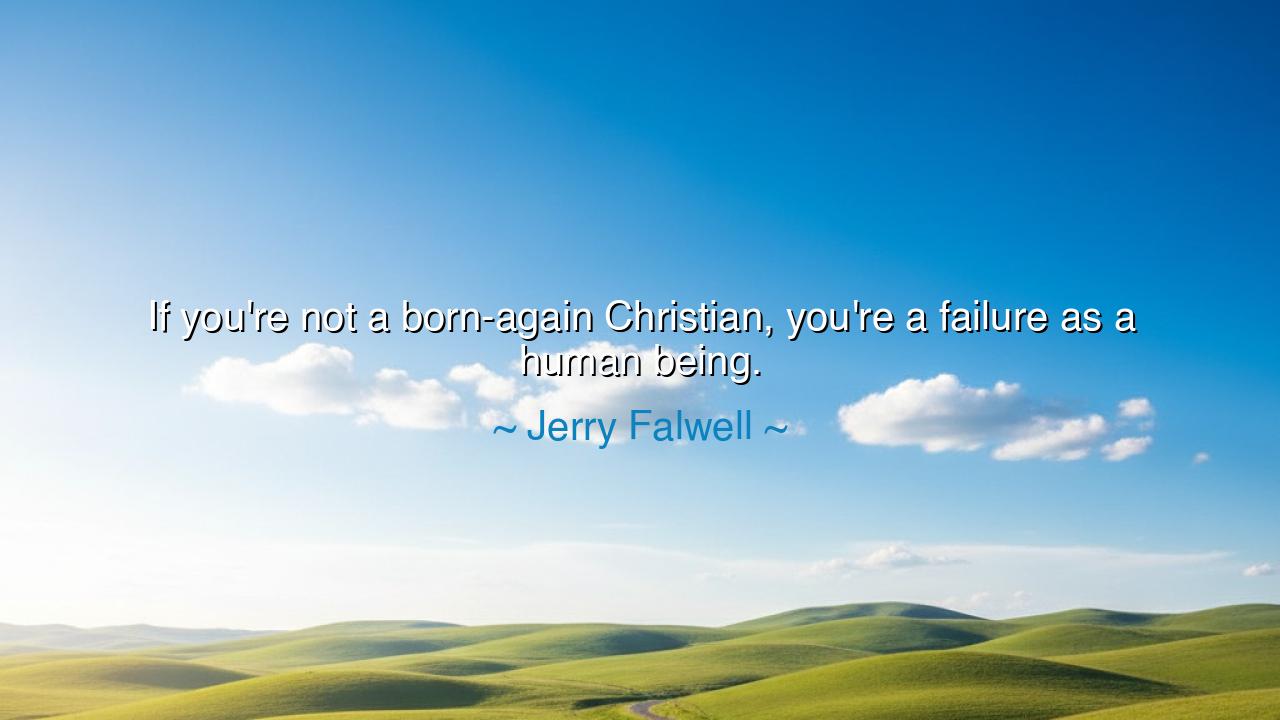
If you're not a born-again Christian, you're a failure as a human






Host: The church hall was empty, save for the flickering of a single candle at the altar. Rain drummed steadily against the stained-glass windows, painting fractured patterns of crimson and blue across the wooden floor. The faint echo of a choir rehearsal still lingered in the air — a ghost of harmony swallowed by silence.
Jack stood at the back of the pews, hands in his pockets, staring at the cross bathed in the candle’s trembling light. His posture was rigid, his jaw clenched, his thoughts a storm behind calm eyes. Jeeny entered quietly, her coat still damp, her steps muffled by the worn carpet that had seen decades of prayers and doubt.
Jeeny: (softly) “Jerry Falwell once said — ‘If you’re not a born-again Christian, you’re a failure as a human being.’”
Jack: (without turning) “Yeah. I remember reading that. And thinking — how small you’d have to make God to fit Him inside one man’s definition.”
Jeeny: “Maybe for him, faith wasn’t about smallness. Maybe it was about certainty.”
Jack: “And certainty’s the enemy of grace.”
Host: The wind howled outside, rattling the heavy doors. Somewhere in the rafters, a beam creaked — the old church breathing, remembering.
Jeeny: “You sound angry.”
Jack: “Not angry. Tired. Tired of people drawing lines around eternity and calling it salvation.”
Jeeny: “He believed what he believed, Jack. Maybe he saw the world falling apart and needed a place to stand.”
Jack: “Sure. But conviction without compassion turns truth into tyranny.”
Host: The candle flickered, casting moving shadows that climbed the walls like restless thoughts. The silence between them deepened — not cold, but heavy with meaning.
Jeeny: “You think faith should be inclusive. Falwell thought it should be exclusive. Both come from fear — one fears separation, the other contamination.”
Jack: “Maybe. But fear has no place in faith. Real faith shouldn’t close doors — it should open windows.”
Jeeny: “Then what’s the point of belief if it doesn’t define anything?”
Jack: (turning toward her) “Belief should define love, not boundaries.”
Host: She walked closer, her footsteps echoing softly through the vast, empty space. The candlelight shimmered between them, a fragile bridge of gold in the dark.
Jeeny: “You know, to Falwell, being ‘born again’ wasn’t just religious — it was moral. A rebirth of conscience. Maybe that’s what he meant by ‘failure as a human being’ — not damnation, but missed potential.”
Jack: “Then he should’ve said that. But men like him never say it softly. They wield salvation like a sword instead of a light.”
Jeeny: “You think he was wrong?”
Jack: (pausing) “I think he was human. He wanted to save people but forgot to love them first.”
Host: The rain softened, turning into a misty rhythm — as if the world outside had started whispering its own kind of prayer.
Jeeny: “Maybe the need for certainty is what keeps people like him alive. The world’s too vast, too painful. Certainty gives it shape.”
Jack: “But it also kills wonder. If you think you already know God, you stop looking for Him in others.”
Jeeny: “And you stop forgiving them.”
Jack: “Exactly.”
Host: The two of them stood in front of the altar now, the cross looming above them, half bathed in light, half swallowed by shadow.
Jack: (quietly) “You know, my mother used to say something different. She said, ‘If you can look at another person and still see something worth saving, that’s being born again.’”
Jeeny: (smiling faintly) “Then she understood grace better than most theologians.”
Jack: “She wasn’t a theologian. Just kind.”
Jeeny: “And kindness is the only gospel that never contradicts itself.”
Host: A long silence followed — not of disagreement, but of shared reflection. The kind that holds both reverence and sorrow.
Jeeny: “You know, I think Falwell was right about one thing — that we need rebirth. The world is full of cynics and broken people. But maybe rebirth doesn’t come from religion. Maybe it comes from remorse.”
Jack: “And from choosing again — choosing good, choosing empathy — every day.”
Jeeny: “Exactly. Maybe being ‘born again’ just means waking up each morning and trying to be less cruel than yesterday.”
Jack: “Then I’d follow that faith.”
Host: The rain stopped completely. The candle’s flame steadied, tall and unwavering, as if listening.
Jack: “You know, sometimes I think the problem isn’t religion itself. It’s certainty. The moment someone says they’ve found the only truth, they stop searching for the others.”
Jeeny: “And forget that truth was meant to be shared, not owned.”
Jack: “Right. Maybe failure as a human being isn’t disbelief. Maybe it’s the inability to see divinity in someone else.”
Jeeny: (quietly) “Then I suppose being born again isn’t a ritual — it’s recognition.”
Jack: (smiling) “Recognition of what?”
Jeeny: “Of the holy in the ordinary. Of forgiveness in the flawed.”
Host: The church bell tolled outside — once, low and resonant. The sound filled the air like an echo of conscience, steady and final.
They stood together, heads bowed slightly, not in prayer but in thought — two souls wrestling with the same ancient paradox: faith as both wound and balm.
And in that still, trembling quiet, Jerry Falwell’s polarizing words melted into something deeper — neither sermon nor rejection, but reflection:
That perhaps to be born again
is not to join a faith,
but to rediscover one’s humanity.
That the failure of a human being
is not disbelief,
but disconnection.
And that true salvation —
whatever name it bears —
lies not in converting others,
but in awakening the heart
to the sacred truth that
grace is never earned — only extended.






AAdministratorAdministrator
Welcome, honored guests. Please leave a comment, we will respond soon